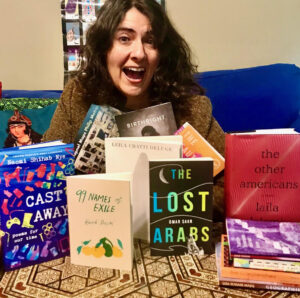
Rahat Kurd, Elif Shafak, and Banah El Ghadbanah.
Banah El Ghadbanah’s next book, a fantasy hybrid-genre poetic novel about the adventures of ancient SWANA goddesses working intergalactically to save Queen Zenobia who is time-traveling to save Syria from destruction.
Erasure poems is my least favorite because it means you have to devote a lot of time to a piece of writing you want to undermine by strip-mining it to create a counter-statement that exposes the ironies of the original text, or its ambiguities or moral flaws or whatever. At least, that’s how I understand erasure poems to work. It’s clever and all that, and the end-result is fun to read, and I certainly enjoy reading erasure poems by other writers—I really value them, in fact, like Solmaz Sharif’s in Look. But I do not want to do erasure poems myself. I come to the desk inspired by the erasure poems I read, and then I balk. Because in the end it means that original piece of writing will have absorbed your energy. You’ve put your eye to it closely, you’ve followed its phonemes and its syllables and letters and words and parsed its details and you know its bones and flesh and nerves. Physically, you have to work with it all those seconds and minutes and hours. And I want a text I love to absorb my energy like that, not a text I want to flip or undermine, or a text I find horrifying, like some head-of-state’s speech or a government manual. But again, the poets who do erasure poems, I fully find their results extremely valuable. I’m glad they’re doing erasure poems. I just won’t do erasure poems.
I paid another poet, whom I love as a person and as a poet, to read my manuscript and tell me what poems she didn’t like or liked, and why, and how to sequence the poems better. Then I revised the manuscript. And then it got accepted and published (My Lover Feeds Me Grapefruit).
Run a Bed and Breakfast.
Mohja Kahf is the author of My Lover Feeds Me Grapefruit, The Girl in the Tangerine Scarf, Hagar Poems, E-mails from Scheherazad, and Western Representations of the Muslim Woman: From Termagant to Odalisque, and co-editor of Constructions of Masculinity in the Middle East and North Africa. Her writing is available in Arabic, Turkish, Japanese, Korean, Italian, French and German translations. She has won a Pushcart Prize, an Arkansas Arts Council Individual Artist award, a Trailblazer Award from the Radius of Arab American Writers, and an award for Lifetime Inclusion in Education from the Northwest Arkansas Democratic Black Caucus.


